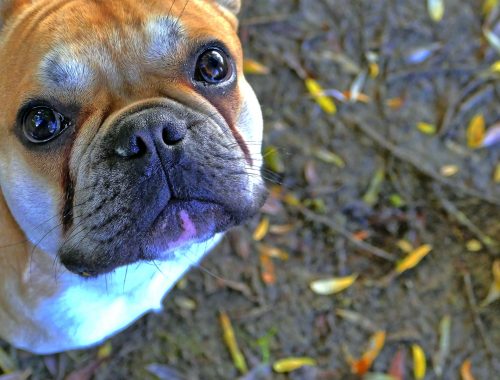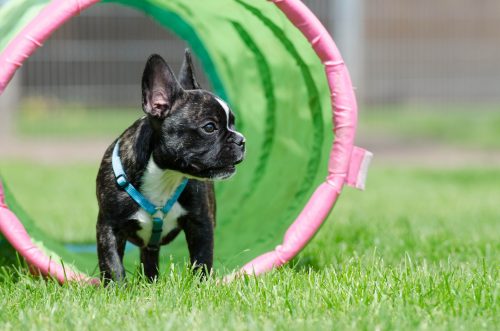French Bulldogs are one of the top ten of the AKC’s most popular dogs, coming right in at the sixth spot. They’re in the top ten because of their charming, outgoing, downright contagious personalities. These little guys have cute, cuddly faces, and a personality that can warm the heart of anyone. They’re naturally docile, well-tempered, and fantastic with children. The French Bulldog is one of the most well-rounded and fantastic companions around.
So you’ve chosen your Frenchie because you want a cute, cuddly friend for the household, and now it’s time to educate yourself on how to properly care for your new dog. The first thing to know: you’re going to need a lot of time and you’ll have to be extremely hands-on with your new pup. This particular breed is a handful, but with that comes high rewards.
As with all dogs, the French Bulldog’s health problems and ailments can be plentiful. They have a rather peculiar bone-structure, and the folds of their facial skin are often a perfect habitat for harvesting bacteria or parasites that can seriously affect their health.
Also, and this tends to happen with very every popular canine — because of the puppy mills working to produce large volumes of puppies, they often neglect their care and breed them poorly. Parents will then assume their puppy is healthy, purebred, and properly examined, only for them to develop health problems down the road.
Allergies

This is one of the harder diseases to diagnose, as there are a variety of different allergies found in dogs that present an array of different symptoms. However, one of the most persistent ailments found in this breed is common allergies, which is often linked directly to their diet. Certain meats, dairy products, wheat-based items, and others can trigger an allergic reaction in dogs. It can also be related to environmental factors (dust, pollen, mold, fleas, etc.)
When it comes to diagnosing your French Bulldog of allergen-related health issues, it’s quite tricky. The veterinarian will issue an intradermal skin test, decide whether or not the condition is diet-related, and then move forward from there. But oftentimes, it becomes a game of elimination.
Once your vet has indeed declared your canine has allergies, then you will have to begin removing certain foods from his diet, cleaning his living environment, and altogether monitoring all the different things your French Bulldog is exposed to.
Symptoms of allergies in French Bulldogs include:
- Excessive liquid in the eyes
- Constant licking, scratching, and sneezing
- Raw and blistered patches of the coat
- Constant itchy skin
- Difficulty keeping food down
Cleft Palate
The mixture of the French Bulldog’s flat face and their proneness to have birth defects can pave the way for deformities. This, of course, doesn’t mean your dog is going to develop this problem, just to say that that due to their bone structure and genetics, it can be possible. The palate is the roof of the mouth, which separates the two different nasal passages. The most common defect is a cleft palate, which can affect various areas of the mouth.
Oftentimes, the cleft palate will be minor and nothing but a cosmetic issue, but more severe cases can cause respiratory problems and require corrective surgery. Due to the deformity, recurrent infections can ensue, and if they’re bad enough, the condition can be life-threatening. Diagnosing the severity of your French Bulldog’s cleft palate requires anesthesia, as it’s quite uncomfortable for dogs, but is a rather simple and effective process.
Symptoms of a cleft palate in French Bulldogs include:
- Difficulty or ‘choking’ while drinking water
- Constant runny nose
- Difficulty eating
- Always short on breath (even if it’s light activity)
Heatstroke
Due to their small size, coats, and facial structure, the French Bulldog is prone to developing heatstroke. The actual condition is called brachycephalic airway syndrome (BAS), which spurred from breeders attempting to create a smaller, ‘teacup’ version of the French Bulldog.
Because they wanted to breed a smaller dog, they ended up elongating the palate and shortening the nasal passages. This, of course, is the very root of many French Bulldog health issues.
French Bulldogs often have a blockage of airflow to the trachea, which causes them to have a tough time cooling down. Once their body temperature ramps up, they have a difficult time regulating enough airflow to stabilize. Similar to human anatomy, if the heatstroke is severe enough, it can be fatal.
Not only is this something to be aware of, as you should constantly regulate your Frenchie’s temperature and assure he is not being overexposed to extreme climates, but also if you have suspicions, to take him to the hospital immediately. Often they will need to be closely monitored to ensure no organ failure ensues.
Symptoms of heatstroke in French Bulldogs include:
- Excessive panting and drooling
- Vomiting blood
- Bright and pinkish gums
- Extreme confusion
- Diarrhea and extreme heart rate
Intervertebral Disc Disease
IVDD is a condition that occurs most often in smaller dogs, and it affects the disks between the vertebrates of the spine. In a way, they begin to become displaced, which then makes it difficult for the two parts to communicate and induces joint immobility in dogs. It can certainly be hereditary, but it can also occur after an injury.
If you suspect that your dog may have IVDD, it’s extremely important to take him to the vet, and have him examined. X-rays can be used to identify the structure of the spine, but often an MRI or CT scan is needed to truly determine exactly where the displacement is occurring, and the proper steps that need to be made to ensure your dog’s health. However, the severity of IVDD varies greatly depending on just how bad the disks are affected.
Symptoms of IVDD in French Bulldogs include:
- Extreme pain in the spine
- Extended bouts of laziness or an unwillingness to jump
- Complaining when being picked up
- Neurological issues (extreme nervousness or change in moods)
- Paralysis
Deafness
Often a hereditary condition in smaller dogs, deafness can affect one or both of the ears and is often diagnosed in a dog’s puppy years. This can occur for a plethora of reasons, but is more often identified when the dog does not respond well to other barks or calls. Thankfully, a Baer test can be conducted in order to diagnose the problem, and a dog with hearing loss can live a perfectly normal and healthy life.
Hip Dysplasia
Canine hip dysplasia isn’t as common in smaller dogs, but it can certainly affect them in some cases. It occurs when there’s a displacement between the thigh and hip joint. The symptoms of hip dysplasia in French Bulldogs include difficulty walking, an abnormal gait, severe pain, and even immobility if it’s bad enough. This condition can be screened for, however, and there are various treatments available.
Cherry Eye

Cherry Eye occurs when the third eyelid (all canines have three eyelids) protrudes due to the tear gland. It causes extreme irritation, can up the risk for canine eye infections, and will even weaken the muscle around the eye, which can cause visual impairment.
Depending on how bad the Cherry Eye is in your French Bulldog, your veterinarian might need to surgically reposition the eyelid so as not to cause an obstruction. This surgery is not invasive, but can cause your dog to have ‘dryer’ eyes in the future.
Hemivertebrae
Hemiverebra is a birth defect that affects the vertebrae in dogs. This means that the vertebrae is abnormally shaped or two have fused together to create a misalignment in the spine.
It’s commonly noticed in the French Bulldog’s tail, and while it may be cute aesthetically, if it’s severe enough, the spinal cord can actually compress, which debilitates the nerve endings and can cause a separation between them and the brain (which actually can cause paralysis).
Thankfully, this condition can often go untreated and the dog will live a perfectly normal life, but in some cases, surgery could be required.
Tips for Keeping Your French Bulldog Healthy
It is important to be consistent with your pup’s hygienic upkeep, grooming routine, and examination process. Their flat and thick skinned faces (due to their palates) can often be the stomping grounds for parasites, fleas, and bacteria. Make sure to wipe your dog’s face with a clean rag daily, and wipe around his eyes as well. Trim his nails monthly because you can’t count on the nails to wear down naturally. Brush your dog’s teeth daily to ensure that there isn’t any tartar or bacteria build up. Additionally, continuously check his body (ears, eyes, nose, and mouth included) for any inflammation, infection, redness, abnormalities, or parasites.

In terms of exercise, remember these are small and fragile animals that require serious tender-love-and care. Not only because they love to be loved, but because their spinal structure can be greatly affected by injury or mistreatment. To further this, do not exercise them robustly or allow them to run around freely in hotter temperatures.
These dogs, like many of the size, can have BAS. The last thing you want to do is allow them to overheat to the point that heatstroke ensues. You have to be particularly aware of this, as often their symptoms can be a bit misleading, when in reality they’re having a difficult time regulating body temperature.
Above all else, take them to the veterinarian. It’s incredible how few dog owners take the time to have their dog examined. Canines, like children, need to be examined by professionals to ensure that they’re growing properly, receiving the proper nutrients, and are on the trajectory to be healthy adults.
Lastly, due to their proneness for allergies, be patient and consistent when it comes to your dog’s diet. Only buy the highest quality of food, and monitor his intake versus how much they’re exercising. Then pay careful attention to how your pup reacts to the food he’s ingesting.
With all of this in mind, if you are aware of the conditions that can afflict your French Bulldog and the steps you can take to keep them healthy, your little companion will live a long and healthy life.





